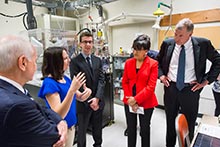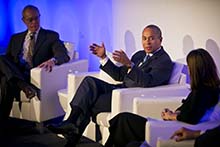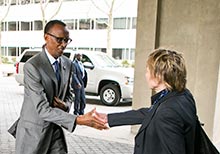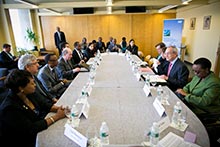Protocol
In event planning, protocol generally refers to the rules of behavior and form one should follow when hosting or interacting with government officials or other organizational leaders/representatives; it also may comprise matters of cultural etiquette. The object of protocol in the context of our work at MIT is to promote an atmosphere of respect and welcome — an atmosphere that allows people to focus on doing their best work.
Protocol applies whenever individuals or entities interact, but questions tend to arise only when there are differences in official rank or culture or function between them (ie, when people are not sure of the rules). Possible scenarios on campus include (but are not limited to!)
- a group of students inviting a faculty member to dine
- a search committee conducting a series of final interview days with candidates
- a prominent expert visiting for a lecture + meetings with colleagues
- a site visit by individual, corporate, or government supporters
- a visit by a government official or delegation
Here are some questions to ask when you sense protocol issues may arise.
- What are the organizational or informal ranks of those involved?
- Is it advisable to engage other Institute colleagues and DLCIs, whether due to protocol or topical issues? Who should make contact?
- Is a formal invitation required? Who is the appropriate signatory? This does not imply that a hard copy invitation is necessary — email from the right person may be fine. Either way, it is helpful to include in an invitation a logistical or program contact, especially if the signatory is a senior leader.
- What is the proper form of address?
- Who will send a thank you after the event?
- Who is the appropriate choice to greet and escort a visitor and to perform introductions? These people may or may not be the same. Where does the greeting take place?
- Is a gift recommended? Need it be presented formally or perhaps at the conclusion of a meeting? By whom?
- If there is a speaking program at your event, who will open the program / introduce your honoree(s) / sit with your guest(s) in the audience?
- Are there other reserved or assigned seating issues to consider?
- What are the needs of a delegation or accompanying staff — separate program and accommodation or do they stay with the principal?
- Will any follow-up be required, other than a thank-you? Who will be responsible and who should be included in the conversation?
Institute Events is available to advise on any of these issues, including questions about whether a request you received needs to be reviewed beyond the DLCI level. Other resources include Kiss, Bow, or Shake Hands by Terri Morrison and Wayne A. Conaway; the US Department of State; the Emily Post Institute; Honor & Respect by Robert Hickey; and the online forms of address provided by the Protocol School of Washington. You may also wish to consult GlobeSmart, the MIT-licensed resource providing detailed information on how to work effectively across cultures.

Secretary of State John Kerry spoke to the MIT community on climate change and renewable energy in 2017
Photo: Bryce Vickmark

US Secretary of Commerce Penny Pritzker visited MIT in 2015
Photo: Justin Knight

Massachusetts Governor Deval Patrick spoke at MIT about accelerating innovation, December 2014

Vice President for Research Maria Zuber welcomed HE Paul Kagame, President of Rwanda, April 2014

Protocol may dictate seating at formal meetings
Photos: Dominick Reuter



